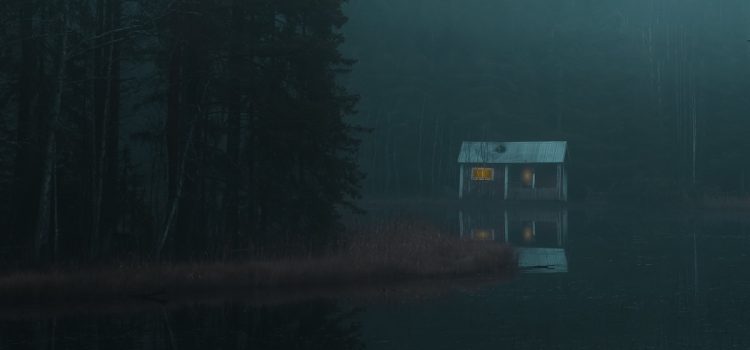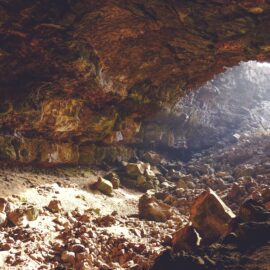

This article is an excerpt from the Shortform book guide to "Walden" by Henry David Thoreau. Shortform has the world's best summaries and analyses of books you should be reading.
Like this article? Sign up for a free trial here.
What did Thoreau do at Walden Pond? Did he spend all of his time in nature? How did he make a living?
In the 1840s, Henry David Thoreau built a cabin at Walden Pond in the woods of eastern Massachusetts and lived there for two years. During that time, he walked in the woods and connected with nature, kept a large garden, worked odd jobs, read books, journaled, went into town, and entertained guests.
Keep reading to learn more about these activities that Thoreau did at Walden Pond.
What Thoreau Did at Walden Pond
What did Thoreau do at Walden Pond? Thoreau found a variety of ways to spend his time when he lived at Walden. When we think of Thoreau, we often envision him walking through the wilderness, observing the birds and squirrels in the summer, and peering into the ice on the pond in the winter. He did spend countless hours paying meticulous attention to the natural world—but he had many other projects that kept him busy.
He Spent Hours Every Day Walking and Observing Nature
First, observing the natural world occupied much of Thoreau’s time. He paid close attention to the animals who lived in the woods, near the pond, and even in various crevices of his cabin. (He mentions a hare who built a nest under his floor, as well as wasps who settled in his windows and walls ahead of the cold Massachusetts winter.) It wasn’t just animals who occupied his attention. Thoreau also became familiar with memorable trees in the area, and he observed how the ponds froze in the winter and thawed in the spring.
Thoreau also spent hours each day walking in the woods. In the winter, no matter how deep the snow was, he ventured out of his cabin and into the woods. He sometimes visited a tree, other times watched an owl, and often left a fire burning in the hearth. (On one occasion, his bedding caught fire while he was away.) Thoreau also listened closely to the woods. He became familiar not only with natural sounds like the calls of bullfrogs and screech owls, but also with the sounds that revealed the presence of other humans in and around the woods. Those included the sounds of trains traveling to and from Boston, carriages passing along the road, church bells in neighboring towns, and the barking of locals’ hunting dogs.
When Thoreau became curious about a natural phenomenon, he investigated it rigorously. For instance, he wondered about the depth of the pond after hearing that some people assumed it was bottomless. So he took soundings and realized that the point where the pond’s widest and longest measurements intersect was also where the water was deepest. He studied Walden Pond and other ponds nearby. He made observations about their shorelines, the color (and taste) of their water, the fish and animals that occupied them, and the fluctuations of their water levels. Thoreau even noticed that the temperature of the water, which varied throughout each pond, affected what kinds of vegetation grew there.
He Cultivated a Field of Beans
Thoreau realized that he needed to make a modest amount of money to pay for his living expenses, such as food and farming supplies, which he calculated at about $10 to $12 annually. (Shortform note: $10 in 1845 is equivalent to about $404 in 2023.) He calculated that his diet of bread (homemade with rye and cornmeal), potatoes, rice, salt pork, and molasses cost 27 cents per week. He made a point of not purchasing tea, coffee, butter, milk, or fresh meat. He even stopped buying yeast after he realized that he could bake bread without it.
To cover his expenses, Thoreau planted a 2.5-acre field primarily with beans. He also grew potatoes, corn, peas, and turnips. He explains that though he didn’t particularly want beans to eat, he cultivated them to sell or to trade for rice. Tending the field took considerable time his first summer at Walden. Because his rows of beans totaled seven miles in length, he worked from five in the morning until noon each day in the field. Thoreau writes that he threw himself into the process of planting, hoeing, harvesting, threshing, picking, and selling beans.
Thoreau even found value in the work that went into preparing the field for planting. That process revealed that he wasn’t the first person to live on the land: He found arrowheads, stones burned by fires, and bits of pottery and glass that provided concrete evidence of the land’s past occupants.
He Did Occasional Day Labor
Thoreau also did occasional work as a day laborer to cover his expenses while living at Walden. Prior to moving to the woods, Thoreau had worked as a school teacher and in “trade.” But, he explains that neither of those occupations would provide the kind of work—or, more importantly, the kind of time—that he envisioned needing while he lived in the woods. By taking jobs that didn’t tie him to a single employer or rope him into a larger project, he provided for himself without spending too much of his time working. When he added up his expenses, Thoreau determined that he could support himself by doing day labor for just 30 or 40 days a year. That left the rest of his time free for other kinds of work.
(Shortform note: Thoreau worked an eclectic range of jobs throughout his life. He graduated from Harvard during the “Panic of 1837,” an economic depression that left him few employment options. So, he took a job as a schoolteacher, which he later resigned because he refused to use corporal punishment. Next, he worked in his family’s pencil factory. Then, he began his own school, which he later closed due to his brother’s ill health. He also lived as a gardener, handyman, and babysitter in the Emerson household. At other times in his life, he worked as a land surveyor, including as the chief surveyor in Concord, gave lectures, and published two books.)
He Read Books and Kept a Journal
Reading occupied a significant part of Thoreau’s time in Walden Woods. Thoreau regarded reading as work that’s worthy and meaningful, like cultivating his bean field. He came to believe that his cabin was a more suitable place for serious thought—and serious reading—than a university. As for what Thoreau regarded as serious reading, he contended that more people ought to read the classics in their original languages—or at least select literature that was more substantive than the simple novels that he complains were popular at the time.
(Shortform note: Historians say Thoreau read French and Latin almost as fluently as he read English. He also read Greek, German, Italian, and Spanish, and as a student, he spent much of his time in the library, reading. Some readers note that Thoreau’s love of reading is one trait he shares with many people with autism spectrum disorders. While some critics call Thoreau a misanthrope, others say such interpretations reveal a neurotypical bias. His honesty, sensory awareness, feeling of being different from others, and deep care for those close to him might feel familiar to people who are neurodivergent. And appreciating these qualities in Thoreau might help us also appreciate the neurodiversity that’s always existed in American literature.)
Finally, writing also kept Thoreau busy. He spent considerable time keeping a journal while he lived at Walden. In his journal, he recorded what he observed and what he thought about during his time in the woods. These journal entries would form the basis for the book later published as Walden. (Shortform note: While he was living in the woods at Walden, Thoreau also wrote his first book, called A Week on the Concord and Merrimack Rivers. That book chronicled a river trip he had taken with his brother John, who had died in 1842 after contracting tetanus from cutting himself while shaving.)
(Shortform note: Some experts say that Walden wasn’t Thoreau’s masterpiece: His journal was. Writing is implicit in everything Thoreau describes doing at Walden. Everything he did, he wrote about—and he may have even done things just to write about them. For example, some experts contend that he may have been less interested in growing beans than in writing about growing beans. Farming gave Thoreau an opportunity to write about farming, and writing gave him a way to think through the philosophy of everything he did during his time in the woods.)
He Walked Into Town Every Few Days
Contrary to popular perception, Thoreau didn’t live deep in the wilderness. Instead, he built his cabin at the edge of the woods, right outside of Concord. He walked the short route into town regularly, following the tracks of the Fitchburg railroad. He writes that, when he was in town, he enjoyed catching up on gossip and news, observing how people lived, buying the rye or cornmeal he needed, and then escaping to the woods again.
(Shortform note: Thoreau lived within walking distance of his friends and family, and he’s been mocked because of rumors that his “mom did his laundry” and “brought him sandwiches” at Walden. Scholars say that it’s unclear who did his laundry. But what is clear, according to essayist Rebecca Solnit, is that Thoreau supported and was supported by his family throughout his life. The women in his family exerted a strong influence over him, including by persuading him and Emerson to adopt strong abolitionist views. They pushed Thoreau and Emerson to air the metaphorical dirty laundry that Solnit characterizes as “the washing that really mattered.”)
Though Thoreau writes that he disliked modern society’s materialism and its lack of meaningful connection with nature—two topics that he addresses repeatedly throughout the book—he didn’t leave Concord or its social issues behind when he moved to Walden. He sought to strike a balance between removing himself physically (and spiritually) from life in Concord and continuing to engage thoughtfully and critically with its society and politics.
(Shortform note: Thoreau’s politics might be difficult to classify as belonging to the political right or the political left as they exist in US politics today. Yet some scholars say that fundamentally, his politics came down to optimism about Americans’ intellectual and spiritual potential. Thoreau believed that if everyone could see beyond the distractions of a rapidly industrializing society and the labor and consumption it demands, they could pursue what’s best for everyone instead of what’s best for themselves as individuals. In other words, he believed people can transcend their individual perspectives to care for their communities and sustain each other.)
He Entertained Visitors at His Cabin
Because he built his cabin within walking distance of Concord, Thoreau could regularly host visitors. He notes that when he outfitted the cabin, he chose to have not one or even two chairs, but three. He anticipated that there might be occasions to entertain several visitors.
(Shortform note: Thoreau’s prediction was correct: He entertained many visitors at his cabin. One of his most frequent guests at Walden was Bronson Alcott, a fellow Transcendentalist whom Thoreau considered a close friend. In Solid Seasons, Jeffrey Cramer writes that Thoreau found friendships hard work. But none were more so than his friendship with Emerson, who often walked with him to and from Walden, likely deep in conversation. Emerson was 14 years older than Thoreau, but they formed a bond that scholars say was spiritual as well as social.)
Thoreau writes that he often had philosophical discussions with people who passed through the woods. One particularly notable visitor was a woodchopper, whom Thoreau admired for his industriousness, his unaffected appreciation for beauty, and his practical perspective, which was informed by his own observations and opinions rather than those of others.
(Shortform note: Thoreau’s lyrical descriptions of the woodchopper, who was named Alek Therien, fuel speculation about whether Thoreau might have been queer. Some scholars speculate that Thoreau was homosexual or asexual. They haven’t found evidence that he was physically intimate with men or women, and he remained a bachelor throughout his life. In Now Comes Good Sailing, James Marcus characterizes Thoreau as “a nonpracticing gay man,” one who didn’t know what to make of his attractions, or of the ideas of sex or love. And some readers have interpreted Thoreau’s retreat to Walden as a choice to run away from society’s heteronormative assumptions and demands, even if only temporarily.)
Thoreau also enjoyed visits from people who lived in poverty or were labeled unintelligent. He writes that when he engaged them in conversation, they often demonstrated wisdom that far exceeded that of the people who had dismissed them. Thoreau explains that he enjoyed the company of people who visited the woods with the intention of really leaving the preoccupations of the city behind them. However, he encountered some people whom he chose to turn away, including those whom he characterized as simply seeking charity.
(Shortform note: Some critics say that Thoreau romanticized poverty but felt inconvenienced by people experiencing poverty. He declined to engage in philanthropy, writing that it didn’t agree with his constitution. Some readers think this fault undermines Thoreau’s entire mission at Walden. These critics say that the point of engaging in self-reflection and learning from the natural world is to become a better person and that Thoreau fails that test. Yet Thoreau has been accused of hypocrisy since before Walden published—and many have found his failure to perfectly practice what he preached condescending. But biographers say that he was full of contradictions—some of which might have a good explanation and some of which might not.)
He Spent a Night in Jail Because of His Politics
Thoreau also remained engaged with politics even though he didn’t live in town. He was unafraid to make his opinions known when he did spend time in Concord. He felt so strongly opposed to some of the national policies of his day—such as slavery and the war on Mexico—that he refused to pay the poll tax he owed to the city of Concord. About halfway through his time at Walden, Thoreau walked into town to collect a shoe he’d left for repair. He encountered a town official who put him in jail for the night for failing to pay the taxes he owed. He was released the following day.
Thoreau also understood the woods as a social, even political, space. The woods weren’t empty, either figuratively or literally: They were (at least for Thoreau) occupied by the ghosts of indigenous people and earlier settlers. When walking through the woods, he also regularly encountered living people, such as railroad workers enjoying a day off and Concord residents hunting, fishing, harvesting ice, or gathering firewood. During his time at Walden Pond, Thoreau also interacted with escaped enslaved people, whom he helped on their way north.

———End of Preview———
Like what you just read? Read the rest of the world's best book summary and analysis of Henry David Thoreau's "Walden" at Shortform.
Here's what you'll find in our full Walden summary:
- The philosophy behind Henry David Thoreau's classic novel
- How you can build a meaningful life by living in harmony with nature
- A look at how Thoreau spent his time at Walden Pond, outside the book






